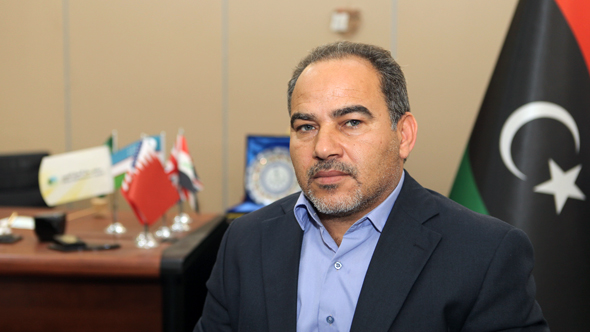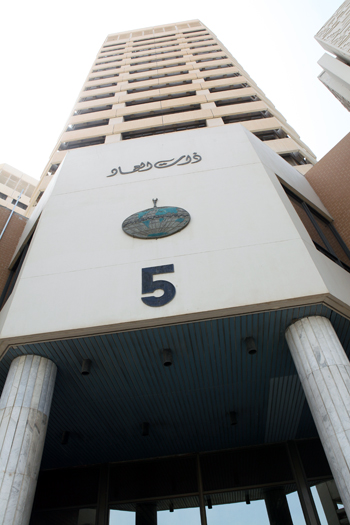Libya’s Trading Sector Gaining Traction
Mohamed Alhanghri, Member of Libyan Businessmen Council
The Libyan Businessmen Council covers many industrial, commercial and production fields, this council is open for all Libyans who are specialized in the fields of trading, industry and services.
Interview with Mohamed Alhanghri, Member of Libyan Businessmen Council

My name is Mohammad AlSagheer Alhanghri, and I am an engineer and a member of the Libyan Businessmen Council. I am also the president of AlJaddah Company, which imports technical and heavy industrial machineries and equipments.
The Libyan Businessmen Council covers many industrial, commercial and production fields, this council is open for all Libyans who are specialized in the fields of trading, industry and services. It is also considered the gateway of trading and business relations between foreign businessmen and the local ones. This council is considered the first of a kind in Libya, it aims to have contacts with the government, the local private sector and foreign international companies. The council aims to boost and support the Libyan economy through the private sector and through energizing the local economy.
The Libyan Businessmen Council covers many industrial, commercial and production fields, this council is open for all Libyans who are specialized in the fields of trading, industry and services.
We are currently facing problems with the public sector which is considered old and incapable of keeping up with the Libyan economy. It is also filled with corruption and lack professionalism. If we look around us, we see that the developed countries got rid of the public sector in the 1960s, so we are putting pressure on the government to do the same here and start with privatization in order to turn it into the private sector that will launch the building and economical development in Libya. Also, we should mention that the public sector is incapable of handling the new wave of graduate workers in the sector.
We are also trying to attract new investments from outside and these investments will take the form of new ideas and modern technology. Now of course, Libya has a strategic position which is in the heart of the world, to the north we have Europe, the traditional trading partner since the old ages as it was the passing route for trading convoys from Europe to Africa and vice versa.
We are aiming to return Libya to its previous status as a trading and transit zone to and from Europe, after this role was neglected for the past 48 years. We also aim to have several trading and exchanging sea ports between Libya, Europe and America, the traditional trading partners. Libya is also ready to exchange goods and products with the far east countries along with Europe and America. Since trading ships will take more time and consume more fuel if they pass through the Gulf area which is also under the threat of war because of Iran and the trouble it stirs with Arab neighbors, while in here the area is safe.
We have a very active tourism sector as we enjoy tourism capabilities which other counties doesn’t have. We have the oldest cities and sites along with very attractive natural areas in the south. Even the sands of deserts in our country hold a special meaning for the Europeans when it comes to travels or rallies. We also have attractive natural areas like Gaberoun and AlNamoos. And let us not forget the old historical Roman, Greek and Phoenician ruins in Libya which can be used to organize public activities.
Also, we enjoy a strong oil sector even though we aim to find other alternatives for income other than oil like tourism and a better use of the sea shores when it comes to tourism and trading projects along with fish farm projects since our coastline stretches for over than 2,000 km and those projects could provide enough fish for Europe. As for the industrial sector, we are preparing the plans for over 60 new industrial areas in all of Libya, and that will be an attractive factor to foreign investment. We also aim to have new and free trading zones for commercial exchange. Even the services sector is active in Libya and that also attracts foreign investments.
What we need in return is certain help from America and Europe to enforce the security in Libya, by giving us ideas and proper methods on how to gather arms, enforce security and selling us modern equipments and weapons along sharing with us intelligence information to deal with any kind of criminal activities.
We are also trying to discover new oil wells in the western area especially in Alhmada, Hod Morzoq and Obari which is rich with oil. While keeping in mind that the area stretching from Boori to Hod Morzoq is an area rich with oil and gas. One of our new goals is to provide sustainable intellectual and administrative development so it turns in the future into a new income source replacing the natural resources we already have. There are also new housing plans approved by the Ministry of Housing in order to build new cities outside the other charts. Of course, when it comes to housing, Libya faces a problem of ghettos since the previous regime closed the last officially planned housing project back in 1983. So the people started building their houses outside the charted areas bringing ghettos to the surface.
Now, after we made a study about these ghettos, we came to know that replacing these ghettos will cost 7 billion Libyan dinars, so we thought about keeping those ghettos and build new cities. That alternative will attract foreign companies whom we invite to take part in this project, since the housing problem is increasing; we have men who reached the age of 50 and still unmarried due lack of financial means or housing. These new housing areas will be modern and according the latest technological standards.
What are your expectations for economic growth?
The population in Libya is 6 million, which causes a problem since the number of population is little compared to area of the country which is 1,656,000 km2. Now, in order for an economy to flourish it needs one of two factors: 1- large population or 2- rich population.
So we need to increase the income of individuals and families because the level of luxury in a society is the factor that boosts the economy. The upcoming plans of constructing 300,000 housing unit will be the first motivating factor in boosting the Libyan economy. And I think that in the coming few years the Libyan economy will be one of the strongest economies in the Mediterranean region.
Lastly, can you talk a bit about your company?
AlJaddah is involved in the importing of heavy machineries and equipments along with the sector of tourism. We have two showrooms in Libya, the first is in Tripoli and the second in AlZawyah. We also deal with many banks. We also deal with construction materials and equipments which are needed in Libya. Added to all that, we have many ties to foreign companies from Italy, France and China, from which we import the needed machines.